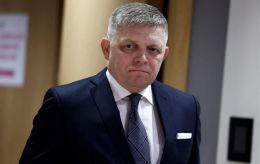Munich Security Conference 2025: Dates and key participants
 Photo: Munich Security Conference 2025 (GettyImages)
Photo: Munich Security Conference 2025 (GettyImages)
The Munich Security Conference 2025 will bring together over 60 leaders from countries and governments next week. Representatives of the new US administration will be present, and Donald Trump's special envoy, Keith Kellogg, has already announced important discussions regarding the end of the war in Ukraine on the sidelines of the conference.
For more details about the 2025 security conference in Munich, see the RBC-Ukraine material below.
Contents
- What is known about MSC 2025
- Program
- Participants of the Conference
- Will Kellogg present a peace plan for Ukraine
What is known about MSC 2025
The Munich Security Conference (MSC) is an international platform for discussing key challenges in foreign policy and global security.
Conferences have been held in Munich since 1963. MSC 2025 will be the 61st edition.
Location and dates: Bayerischer Hof Hotel, from February 14 to 16.
This year's conference will take place against the backdrop of political changes in several countries: the start of the administration of the 47th President of the United States, Donald Trump; upcoming elections in the Bundestag in Germany; and a new cycle of the European Union legislative assembly in Brussels.
MSC 2025 will be opened by German President Frank-Walter Steinmeier on February 14. Christoph Heusgen will preside over the conference.
On the last day of the event, Heusgen was expected to be succeeded by former NATO Secretary General Jens Stoltenberg. However, Stoltenberg was invited to head the Norwegian Ministry of Finance. Stoltenberg has stated that he will fulfill his duties as MSC chair after his tenure in the Norwegian government.
During the transitional period, the conference will be led by two current deputy chairs of MSC, Benedikt Franke and Rainer Rudolf.
Program
As in previous years, the conference program will consist of three parts: the main program, curated by MSC, around 200 side events, and dozens of public events. The agenda will be published on February 13.
February 14 – the main program of the conference will begin with a focus on global security challenges, including global governance, democracy resilience, climate security, and many other topics.
February 15 – debates will take place on the state of the international order, regional conflicts and crises, as well as transatlantic partnership.
February 16 – the conference will conclude with a discussion on Europe's role in the world.
Participants of the Conference
The organizers of the Munich Security Conference report over 60 participants from among heads of state and governments, as well as around 150 ministers and leaders of international organizations. However, the full list of participants has not yet been made public.
So far, NATO Secretary General Mark Rutte, European Commission President Ursula von der Leyen, European Parliament President Roberta Metsola, European Council President António Costa, EU High Representative for Foreign Affairs and Security Policy Kaja Kallas, and European Commissioner for Defense Andrius Kubilius have announced their intention to attend.
It is expected that the US will be represented by the new Vice President JD Vance and US President's Special Envoy for Ukraine and Russia, Keith Kellogg.
The MSC will take place a week before the German Bundestag elections, so candidates for Chancellor will participate: current Chancellor Olaf Scholz (SPD), CDU candidate Friedrich Merz, Green candidate Robert Habeck, and Christian Lindner from the Free Democratic Party.
At the same time, representatives of the far-right party Alternative for Germany (AfD) and the left-wing Alliance of Sahra Wagenknecht (ASV) were not invited to the event.
Conference Director Christoph Heusgen explained the decision by stating that both parties do not adhere to the core principle of the conference – "peace through dialogue." Heusgen reminded that the AfD and ASV left the German Bundestag during a speech by Ukrainian President Volodymyr Zelenskyy. He said that it was the opposite of dialogue and that he did not want to see anything like that at the conference.
Will Kellogg present a peace plan for Ukraine
The topic of the war in Ukraine will most likely be central to the discussions at the conference. US Special Representative Keith Kellogg has announced broad discussions on this issue with allies on the sidelines of MSC 2025.
Ahead of the event, Western media reported that Kellogg would present a peace plan for Ukraine in Munich. However, he denied this information. Kellogg stated that he would not publicly present a plan for ending the war, as that is the responsibility of US President Donald Trump.
"The person who will present the peace plan is the President of the United States, not Keith Kellogg. That's not going to happen next week. We are going to have great discussions with European leaders and will bring back everything to the President of the United States. And then go from there," the American general said about his participation in MSC.
The special envoy mentioned that in Munich, he would meet with world leaders to discuss Russia's war against Ukraine.
Kellogg stated that he wanted to gain a better understanding of the positions of other countries, including the United Kingdom, Germany, Denmark, and other partners, regarding the settlement of the war.
After the Munich Security Conference, Keith Kellogg may visit Kyiv. The visit is planned for February 20.
Sources: official MSC website, materials from Fox News, AP, Welt.

